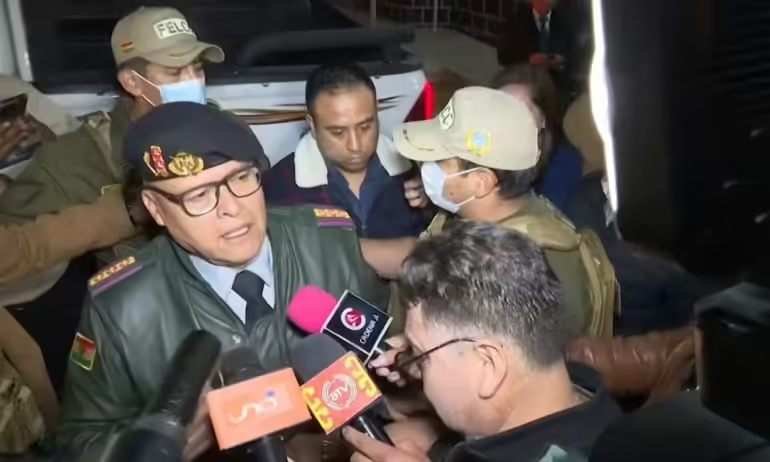Minister says alleged putschists will be charged with crimes after apparent mutiny in volatile country
The former heads of Bolivia’s army and navy are among a dozen people so far arrested for their alleged roles in a seemingly bungled military coup designed to topple the South American country’s leftwing president, Luis Arce.
Speaking on Thursday morning, just over 12 hours after the fleeting insurrection in La Paz, Bolivia’s minister of government, Eduardo Del Castillo, accused the former army chief Gen Juan José Zúñiga Macías and the former head of the navy R Adm Juan Arnez Salvador of leading a group of putschists who had “conspired to bring down a democratically elected government”.
“They will be charged with crimes that could see them jailed for between 15 and 30 years,” Del Castillo told the local TV channel Unitel, promising to reveal more details of the recent events later in the day.
The minister claimed conspirators had been plotting “this attempt to destroy democracy” for at least three weeks before security forces seized control of the historic Plaza Murillo in La Paz at about 2.30pm on Wednesday and forced their way into the government palace known as the Palacio Quemado.
Before retreating from the scene in a bulletproof vehicle and being taken into custody, Zúñiga told reporters his aim was to establish “a true democracy”.
In his television interview, Del Castillo claimed that on Tuesday night, the eve of the alleged revolt, Arce and Zúñiga had met in the presence of another senior minister and that the president had informed the army chief he was being relieved of his duties because his conduct “was not in line with the political constitution”.
“No problem … I’m a soldier of this homeland … and will carry out whatever orders you give me,” Zúñiga supposedly replied.
Del Castillo claimed the two men then embraced, adding: “Nobody could have imagined that the next day … our country would see a failed coup attempt.”
Wednesday’s brief and still poorly explained mutiny, which lasted only around 3 hours and reportedly saw 12 people injured, was the latest convulsion to grip a notoriously volatile nation that has witnessed 190 revolutions and coups since it gained independence in 1825.
Adding to the confusion were comments made by Zúñiga in the moments before he was detained, in which the ex-army chief appeared to accuse Arce of staging a sham coup in order to boost his flagging popularity. “The president told me the situation was fucked and that he needed something to boost his popularity,” Zúñiga said, without providing evidence.
Bolivia, a landlocked country of about 12.5m citizens, is currently enduring a punishing economic crisis with gas exports plummeting and social unrest on the rise. To make matters worse, a bitter power struggle is playing out between Arce and Evo Morales, the former president who helped elect him in 2020. Both men have said they plan to seek the presidency in next year’s election for their party, the Movimiento al Socialismo (Mas).
On Thursday, some Morales allies and opposition figures used social media to promote conspiracy theories about Arce being responsible for the supposedly bogus military rebellion. Alejandro Reyes, an opposition congressman from the Comunidad Ciudadana coalition, demanded a parliamentary inquiry into claims that Arce had himself orchestrated an “autogolpe” (self-coup). “There are indications and declarations that indicate the involvement of the government,” Reyes said.
María Nela Prada, the minister for the presidency, rejected such claims. “This absolutely false … these are things that I find utterly inconceivable,” she said.
Deisy Choque, a Mas lawmaker, hailed president Arce – a UK-educated former finance minister – as a hero. “He will never be seen as a coward or a traitor – he stood up to the coup attempt and democracy triumphed,” Choque said.
As the war of words intensified, armed police, their faces covered with balaclavas, guarded the wrought iron gates of the 19th-century neoclassical palace where much of the previous day’s drama had unfolded. Inside, two women could be seen sweeping up shattered glass from the floor where Arce had been filmed confronting Zúñiga, telling him: “I am your captain … withdraw all of your troops right now, general.”
The apparent coup attempt in Bolivia was the subject of almost universal condemnation from across the political spectrum in Latin America, with conservative governments in Ecuador, Uruguay and Paraguay speaking out as well as leftwing ones in Brazil, Chile, Colombia and Mexico.
But there were some hints of approval from segments of the region’s burgeoning far right. Bia Kicis, a prominent Brazilian congresswoman who is close to the ex-president Jair Bolsonaro, reacted to reports of the insurrection by tweeting: “Thank God!” Bolsonaro’s former environment minister Ricardo Salles appeared to suggest he thought the Bolivian putschists had “cojones” (balls).
The Argentine newspaper La Nación noted how it had taken the administration of Javier Milei, its far-right libertarian leader, six hours to condemn the failed coup.


